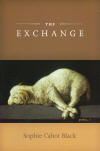The Exchange
“Poetry is my way to understand what is difficult. How one thing can be explained through another—is to get closer, to unhide what feels hidden,” explained poet Sophie Cabot Black in an interview last year with The New Yorker. The Exchange, Black’s third collection of poetry, delves into deeply difficult subjects, primarily the loss of a beloved friend to leukemia—poet Jason Shinder, author of Stupid Hope (Graywolf Press, 2009). Like Black’s previous two collections, the poems in The Exchange render their speakers’ worlds in tight descriptions rich with the play of a quick mind. In The Exchange, the realm of finance and the Biblical story of Abraham’s willingness to sacrifice his son Isaac additionally play central roles, expanding the book’s lexicon of loss, gain, and worth. Using these three strands, Black crafts a cohesive collection of tightly woven, ruthlessly examining poems.
“Poetry is my way to understand what is difficult. How one thing can be explained through another—is to get closer, to unhide what feels hidden,” explained poet Sophie Cabot Black in an interview last year with The New Yorker. The Exchange, Black’s third collection of poetry, delves into deeply difficult subjects, primarily the loss of a beloved friend to leukemia—poet Jason Shinder, author of Stupid Hope (Graywolf Press, 2009). Like Black’s previous two collections, the poems in The Exchange render their speakers’ worlds in tight descriptions rich with the play of a quick mind. In The Exchange, the realm of finance and the Biblical story of Abraham’s willingness to sacrifice his son Isaac additionally play central roles, expanding the book’s lexicon of loss, gain, and worth. Using these three strands, Black crafts a cohesive collection of tightly woven, ruthlessly examining poems.
In “Already Broken,” Black writes, “You must write as if all along a flaw / Was on the bone, one place not quite right.” As the collection unfolds, these words echo as instructions to the writer: step back, look back at events knowing how things end, how loss becomes reality. Crucial to this approach is distance. As in her first two books, Black’s poems present scenes that feel both precisely observed and kept at arm’s length. “A motel kneels at the end / Of the parking lot; the ocean beats its head / Against rock,” observes the speaker of “Dark Harbor,” describing a desolate scene stripped of adjectives. As in this example, the weight of Black’s poems hangs on simple nouns like window, bed, bird, mountain. The world of loss comes to us concentrated into key objects and the sharply felt emotions they convey.
From Donald Hall’s “The Ship Pounding” (Without, Houghton Mifflin, 1998) written about his wife and fellow poet Jane Kenyon’s struggle with leukemia, Black picks up the ocean and ships as images and metaphors for illness. Unlike Hall’s “huge / vessel that heaves water month / after month,” however, Black uses these images on a smaller scale. The speaker of “You Said It Was Not” watches her lost friend “turn away and into / The wind the water the open boat,” lamenting “how you get to be everything, / Get to be what is gone and wanted back.” Life after a loved one’s death becomes a boat crashing “Through the tumbling ocean, her steering // Gone” (“Man Overboard”). Similar to her focus on simple, concrete nouns, Black’s use of smaller images—a boat, rather than a ship, flounders on the waves—strengthens the sense of personal loss.
Surprisingly, Black’s incorporation of the language of finance and the Biblical story of Abraham and Isaac similarly adds to the collection’s sense of personal, rather than large-scale, experience. While both of these themes involve or bear upon large communities of people, Black examines them with a heightened awareness of the role played by individuals. “Somewhere in New Jersey Is the Center,” a poem about the New York Stock Exchange’s Data Center in Mahwah, New Jersey, shrinks this hub of activity to a haunted, lonely place where
Who
Would hear as you run each formula
Into the night, examine what is wrought
In the cables, the ceaseless flicker.
Similarly, Black focuses on the personal interactions of father and son in the story of Abraham and Isaac rather than on the larger implications the story might have for notions of faith and sacrifice. For instance, in “Analysis,” after Abraham sacrifices a ram rather than Isaac, Black shows us father and son leaving one another and “how the mountain // Is revealed as each now descends a different face, / One toward any new land, the other home to bed.” By focusing on the personal as she examines finance and the Biblical narrative, Black allows these strands to resonate with the personal story of loss also unfolding in the text.
Although Black’s deftly woven scenes and sharp intellect make The Exchange a collection worth reading, part of what makes it so deeply compelling stems from her honesty about what loss entails—not only sorrow, but also anger and guilt. “Everything feels like payment,” she writes in “Pay Attention.” In “Dominion Over the Larger Animal,” the speaker confesses:
I know what will happen next, to leave the hill
As the body stiffens, to pass each blossom
Of blood in the snow as if I understood
All I was capable of.
In The Exchange, Black considers the meaning of capability—our capability to suffer, to deal with loss, to cloak our actions through terminology and narrative. These poems might keep you at arm’s length through spare writing and weighty ideas, but they also draw you in, asking you to look and to think with a direct gaze. The Exchange merits attention for the way it approaches deeply difficult subjects honestly, with a keen eye for the truth.





